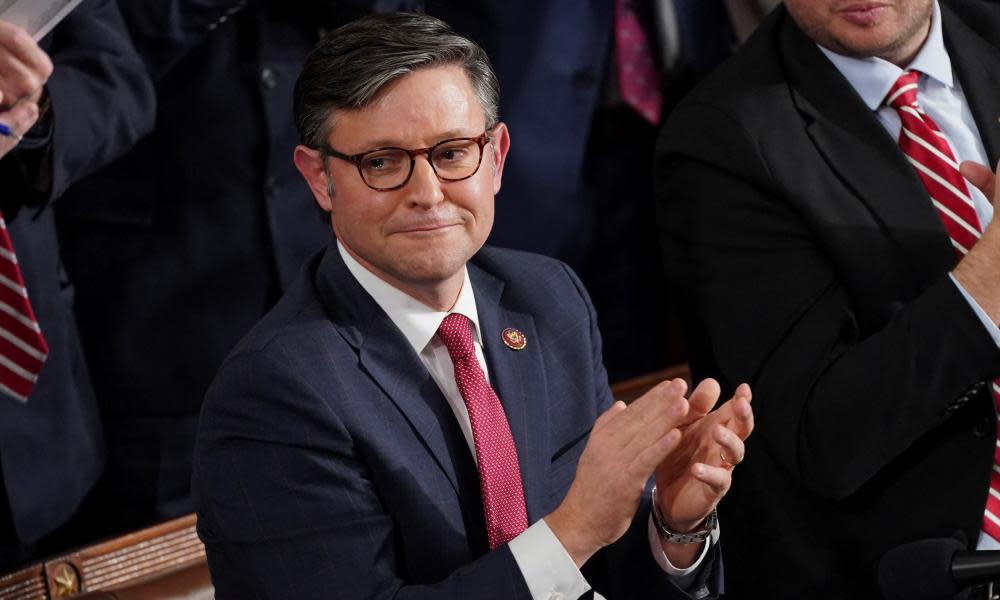Republican Mike Johnson elected House speaker after weeks of chaos

Republican Mike Johnson of Louisiana was elected speaker of the House on Wednesday, winning the top job in a party-line vote and ending a standoff that had stretched on for more than three weeks.
In the floor vote, Johnson won the support of all 220 Republicans who cast a ballot, while all 209 Democrats present voted for their leader, Hakeem Jeffries of New York. Due to four absences in the chamber, Johnson needed 215 votes to become speaker.
Delivering his first speech as the 56th speaker of the House, Johnson vowed to “rebuild and restore” the trust of the American people, which he acknowledged had been damaged by the chaos of recent weeks.
“At this time of great crisis, it is our duty to work together, as previous generations of great leaders have, to face these great challenges and solve these great problems,” Johnson said.
“We want our allies around the world to know that this body of lawmakers is reporting again to our duty stations. Let the enemies of freedom around the world hear us loud and clear: the people’s House is back in business.”
In a statement congratulating Johnson on his victory, Joe Biden pledged to “work with [House Republicans] in good faith on behalf of the American people”.
“Even though we have real disagreements about important issues, there should be mutual effort to find common ground wherever we can,” Biden said. “This is a time for all of us to act responsibly, and to put the good of the American people and the everyday priorities of American families above any partisanship.”
Johnson won House Republicans’ speaker nomination on Tuesday evening, just hours after Tom Emmer of Minnesota, the majority whip, was forced to withdraw from the race amid criticism from Donald Trump. Defeating Byron Donalds of Florida after three rounds of voting, Johnson became House Republicans’ fourth speaker nominee in three weeks.
Related: Who is Mike Johnson, the new Republican House speaker?
An internal rollcall vote taken after Johnson’s nomination showed no opposition to his speakership bid, although a number of Republicans were absent. In the hours leading up to the floor vote, several House Republicans who had opposed previous speaker nominees indicated they would support Johnson, paving the way for his victory.
Johnson’s election brings an end to a standoff that began earlier this month, when eight House Republicans joined Democrats to oust former speaker Kevin McCarthy of California. In the weeks since, three other speaker nominees – Steve Scalise of Louisiana, Jim Jordan of Ohio, and Emmer – have tried and failed to unite the Republican conference.
Without a speaker in place, the House has been unable to advance any legislation. Biden has called on Congress to pass an aid package to assist America’s allies such as Ukraine and Israel, but the House could not take up such a bill until a new speaker was elected. Johnson said on Wednesday that the first measure taken up under his speakership would be a resolution expressing support for Israel amid its war against Hamas.
Although Johnson’s election will allow the House to resume business, Democrats have made clear that they will use the new speaker’s political record against vulnerable Republicans in the elections next year.
Johnson has already faced questions over his history of supporting Trump’s efforts to overturn the results of the 2020 presidential election. Johnson, who practised constitutional law before entering politics, was the architect of a questionable legal argument that offered air cover to House Republicans who wanted to sign an amicus brief urging the US supreme court to throw out the electoral votes of key battleground states won by Biden. More than 100 House Republicans signed on to the amicus brief, but the supreme court ultimately threw out the underlying lawsuit challenging the election results.
Democrats believe Johnson’s central role in disputing the 2020 election results and his conservative views on many social issues could help them win back the House next year. Some Democrats were heard saying “bye bye” as House Republicans representing battleground districts, such as Mike Lawler of New York, cast their votes for Johnson.
Delivering remarks after Johnson’s election, Jeffries pledged Democrats would “protect the peaceful transfer of power” and “continue to push back against extremism in this chamber and throughout the country”, while simultaneously promising to seek bipartisanship whenever possible.
“The time for partisanship is over. It’s time to get back to doing the business of the American people,” Jeffries said. He then reminded Republicans: “Joe Biden won the 2020 presidential election. He’s doing a great job under difficult circumstances, and no amount of election denialism will ever change that reality – not now, not ever.”
Speaking after Jeffries, Johnson similarly pledged to work with Democrats on points of mutual interest, while acknowledging their starkly different policy preferences.
“I do look forward to working with you on behalf of the American people,” Johnson told Jeffries. “I know we see things from very different points of view. But I know that in your heart, you love and care about this country and you want to do what’s right, and so we’re going to find common ground there.”
Even though the House is now open, Johnson’s challenges in uniting his deeply divided conference may be just beginning. Government funding is set to expire in less than a month, and Johnson risks causing a federal shutdown unless he can convince fellow Republicans to back a stopgap funding measure. That same dilemma caused the downfall of the last Republican speaker.


